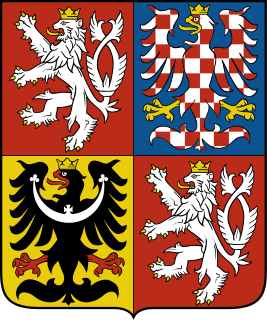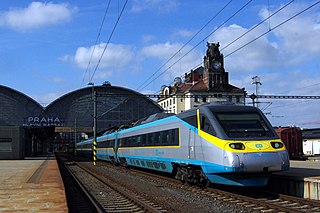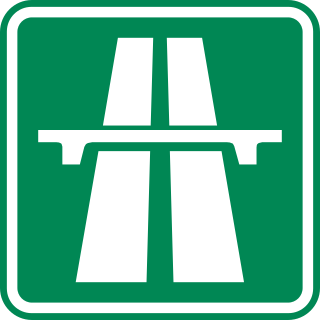Contents
This is list of archives in the Czech Republic.
This is list of archives in the Czech Republic.

The Czech Republic, also called Czechia is a landlocked country in Central Europe. Historically known as Bohemia, it is bordered by Austria to the south, Germany to the west, Poland to the northeast, and Slovakia to the southeast. The Czech Republic has a hilly landscape that covers an area of 78,871 square kilometers (30,452 sq mi) with a mostly temperate continental and oceanic climate. The capital and largest city is Prague; other major cities and urban areas include Brno, Ostrava, Plzeň and Liberec.

The Czech Republic is a unitary parliamentary republic, in which the President is the head of state and the Prime Minister is the head of government.
Executive power is exercised by the Government of the Czech Republic which reports to the Chamber of Deputies. The Legislature is exercised by the Parliament. Czech Parliament is bicameral, the upper house of the Parliament is the Senate, the lower house of the Parliament is the Chamber of Deputies. The Senate consists of 81 members who are elected for six years. The Chamber of Deputies consists of 200 members who are elected for four years. The Judiciary system is topped by the trio of Constitutional Court, Supreme Court and Supreme Administrative Court.
The highest legal document is the Constitution of the Czech Republic, complemented by constitutional laws and the Charter of Fundamental Rights and Freedoms. The current constitution went in effect on 1 January 1993, after the Dissolution of Czechoslovakia.

Transport in the Czech Republic relies on several main modes, including transport by road, rail, water and air.

Moravia is a historical region in the east of the Czech Republic and one of three historical Czech lands, with Bohemia and Czech Silesia.

Brno is a city in the South Moravian Region of the Czech Republic. Located at the confluence of the Svitava and Svratka rivers, Brno has about 380,000 inhabitants, making it the second-largest city in the Czech Republic after the capital, Prague, and one of the 100 largest cities of the EU. The Brno metropolitan area has almost 700,000 inhabitants.

Ostrava is a city in the north-east of the Czech Republic, and the capital of the Moravian-Silesian Region. It has about 280,000 inhabitants. It lies 15 km (9 mi) from the border with Poland, at the confluences of four rivers: Oder, Opava, Ostravice and Lučina. Ostrava is the third largest city in the Czech Republic in terms of both population and area, the second largest city in the region of Moravia, and the largest city in the historical land of Czech Silesia. It straddles the border of the two historic provinces of Moravia and Silesia. The wider conurbation – which also includes the towns of Bohumín, Havířov, Karviná, Orlová, Petřvald and Rychvald – is home to about 500,000 people, making it the largest urban area in the Czech Republic apart from the capital, Prague.

Pardubice Region is an administrative unit of the Czech Republic, located mainly in the eastern part of its historical region of Bohemia, with a small part in northwestern Moravia. It is named after its capital Pardubice. As an administrative unit, Pardubice Region has existed three times in the course of history. It was established for the first time in 1850, and extended from Český Brod to the Bohemian-Moravian border. In its second existence, it was one of 19 regions as they were set between 1949 and 1960. After 1960, Pardubice became the capital of Pardubice district, which was part of the Eastern Bohemian Region. The Pardubice Region, as it is now, was reestablished in 2000.

Český rozhlas (ČRo) is the public radio broadcaster of the Czech Republic operating since 1923. It is the oldest radio broadcaster in continental Europe and the second oldest in Europe after the BBC.

Brno–Tuřany Airport is an airport in Brno, Czech Republic. It is about 7.5 km (5 mi) from Brno's city center, on the edge of the historical Austerlitz battlefield. The airport is about 120 km (75 mi) from other international airports, such as Vienna Airport and Bratislava Airport and smaller international airports in Ostrava and Pardubice.

Obec is the Czech and Slovak word for a municipality. The literal meaning of the word is "commune" or "community". It is the smallest administrative unit that is governed by elected representatives. Cities and towns are also municipalities.

The Czech Hydrometeorological Institute is the central state office of the Czech Republic in the fields of air quality, meteorology, climatology and hydrology. It is an organization established by the Ministry of the Environment of the Czech Republic. The head office and centralized workplaces of the CHMI, including the data processing, telecommunication and technical services, are located at the Institute's own campus in Prague.
The Czech National Football League, currently known as Fortuna národní liga due to sponsorship reasons, is the second level professional association football league in the Czech Republic. Before 2013 it was known as 2. liga or Druhá liga. The top two teams each season are eligible for promotion to the Czech First League.

The history of the Jews in the Czech lands, which include the modern Czech Republic as well as Bohemia, Czech Silesia and Moravia, goes back many centuries. There is evidence that Jews have lived in Moravia and Bohemia since as early as the 10th century. As of 2005, there were approximately 4,000 Jews living in the Czech Republic.

Svobodní, until 2019 known as the Party of Free Citizens or the Free Citizens' Party, is a classical liberal and right-libertarian, Eurosceptic political party in the Czech Republic founded in 2009 by Petr Mach, an economist and professor of macroeconomics. Before assuming his position as an MEP, Mach taught economics at VŠFS and VŠEM. The party is led by Libor Vondráček.

Brno main railway station is the principal railway station in Brno, the largest city in the Moravia and the second largest in the Czech Republic. The railway station is situated in the city centre on the former fortification wall circuit, within walking distance of the most important city buildings. It is one of the oldest railway stations in the Czech Republic, having been in operation since 1839.

Highways in the Czech Republic are managed by the state-owned Road and Motorway Directorate of the Czech Republic – ŘSD ČR, established in 1997. The ŘSD currently (2018) manages and maintains 1,250 km of motorways (dálnice), whose speed limit is of 130 km/h or 80 mph. The present-day national motorway network is due to be of about 2,000 km before 2030.

Zdeňka Wiedermannová-Motyčková was a Moravian teacher, journal editor, and women's rights activist. Born into a family of progressive educators, she studied to become a teacher, graduating in 1886. Her Catholic education led her to more conservative values than her family's, but after teaching for several years, she began to recognize the disparities between women and men teachers, as well as those of their students. By 1898, she was publicly calling for equal pay for equal work and campaigning for equal education for boys and girls. In 1902, Wiedermannová founded and became chair of the Moravian Teachers Union, whose focus was to professionalize teaching standards. The following year, she opened a Girls' Academy in Brno, hoping later to include secondary education there. As the Austro-Hungarian Empire provided little funding for girls' education, she held lectures to provide for the operating costs of the academy. Finally in 1908, she successfully established the first girls' secondary school in Moravia.

The Moravian Land Movement is a political movement committed to the ideas of modern European regionalism and traditional Moravian state self-government. It follows the Movement for Autonomous Democracy–Party for Moravia and Silesia.

Karel Pauzer is a Czech sculptor, ceramist, painter, printmaker and restorer.